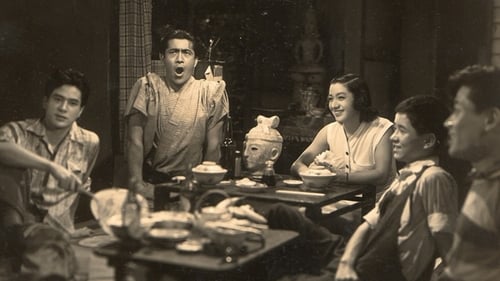
Yamamoto
Following the Second World War, the lives of various people in a poverty-stricken area of Tokyo are entertwined. Pachinko parlor girls, shoeshine boys, a maker of costume jewelry, and a streetcorner artist all struggle to make their livings and to find happiness in difficult surroundings.

Mantaro
Directorial debut by Umetsugu Inoue, the famous director of Musicals

President Kuwabara
1950s Japanese comedy.

Suyama

In a small town, according to the homecoming of Professor Ishinaka, the youth culture group was overwhelmed to make a presentation for the summer festival, but because of lack of funds, she works part-time at the spectacle of a tour, a haunted house Especially. The ghost was a struggle amongst the people, it was a great success in filling the crowd, but in the circus hut next to it, Kenji who was supposed to have disappeared was pitiful.

Japanese "kayo" film based on the song "Ieraishan" by Yoshiko Yamaguchi.
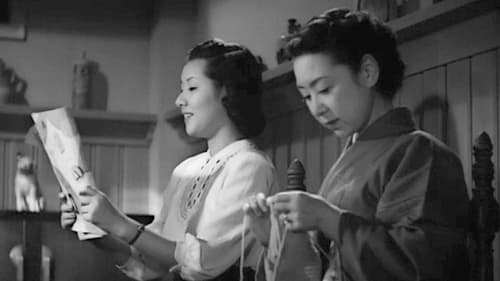
세츠코는 남편 미무라 때문에 불행한 결혼 생활을 이어가고 있다. 엔지니어 출신의 남편이 직업도 얻지 않고 매일 술만 마시는 까닭에 괴로운 것이다. 그럴 때마다 세츠코의 마음속에는 오래 전 헤어질 수밖에 없었던 히로시가 떠오른다. 사랑하는 사이였지만 프랑스 유학 때문에 헤어질 수밖에 없었던 것. 하지만 히로시가 돌아오면서 새로운 국면을 맞이한다.

Adaptation of a novel by Yojiro Ishizaka, originally released in two parts.

Ginpei
An early film by Kon Ichikawa
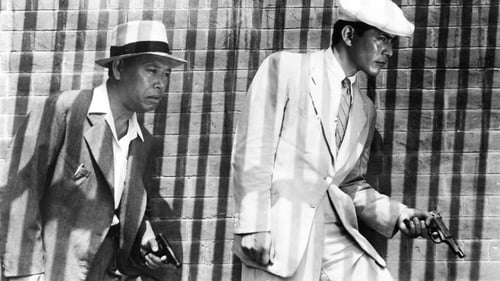
무더운 여름날, 만원 버스에 오른 초보형사 무라카미(미후네 도시로)는 소매치기에게 권총을 도둑맞는다. 고참 형사 사토(시무라 다카시)의 조언에 따라 사라진 권총의 단서를 추적하는 무라카미. 버스에서 그에게 달라 붙어 있던 중년 여인은 알고 보니 일급 소매치기였다. 무라카미가 그녀를 미행하는 동안 도심 한 복판에서는 총기 강도사건이 일어난다.
거장 구로사와 감독의 초기 수작으로 일본 전후 사회의 매우 리얼한 풍경 묘사는 물론 범죄 수사과정을 하나부터 열까지 꼼꼼하게 좇아가는 치밀함을 느낄 수 있는 정통 형사물이다. 각본가 기쿠시마 류조가 경시청 취재 중 듣게 된 경관 권총 분실 사건을 소재로 만든 영화. 끈적하게 땀이 배일 것 같은 후덥지근한 여름의 분위기와 종전 후 서서히 부흥되어 가고 있는 도쿄의 실상이 매우 리얼하게 담겨 있다. ‘메그레 경감’ 시리즈로 유명한 추리소설가 조르주 시므농의 팬이기도 했던 구로사와는 긴박감 넘치는 추리영화의 틀을 빌려, 전후의 피폐한 현실과 가치관의 혼란을 탁월하게 묘사해 냈다. 모리사키 아즈마에 의해 1973년 리메이크되었으며, 아오야마 신지의 (1997) 역시 직접적인 영향을 받았다. , , 등 많은 미국영화에서 이 작품에 오마주를 바친 장면들을 발견할 수 있으며, 특히 조지 루카스의 에서 오비완 케노비가 라이트 세이버를 떨어뜨린 아나킨을 힐책하는 장면은 사토가 무라카미를 질책하는 장면을 그대로 인용한 것이다.

Edokko
The tale of a feudal swordsman who cynically takes no responsibility for anything, relegating it to others, and then taking the credit.

The tale of a feudal swordsman who cynically takes no responsibility for anything, relegating it to others, and then taking the credit.

A film dealing with the comings and goings of individuals in the immediate postwar period.

Bando Tokichi
부모가 정한 인담을 싫어, 오사카를 나와 도쿄에서 회사 근무를 하고 있는 카와키타구미의 오조지·코로쿠. 어느 때 그는 상경해 온 허수아·란코를 도망쳐 하숙처를 옮겨, 거기서 만난 테루코와 사랑에 빠진다. 하지만 카와키타조는 파산 위기에 있어서 란코와의 결혼은 놓칠 수 없는 것이 되었다.
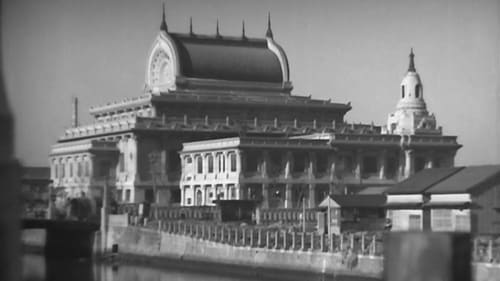
Tamekichi
1947년 패전 후 오즈가 만든 첫 작품으로, 류 치슈와 이다 조코의 호연이 돋보이는 작품. 동시대 감독들이 전쟁 체제에 대한 비판이나 반성 등을 그린 작품을 양산해내던 당시에도 전쟁 전과 마찬가지로 오즈가 선택한 첫 제재는 ‘인정’이었다. 전후 일본 사회에 대한 귀중한 다큐멘터리와 같은 이 작품은 오즈 특유의 정적인 영상 속에 인간적이면서도 감동적인 삶의 메시지를 전해 주고 있다. 도쿄의 한 거리에서 잡화상을 운영하는 다네에게 길 잃은 아이 고헤이가 억지로 맡겨진다. 사람에 대한 정과 사랑에 무심했던 다네는 고헤이를 부랑아 취급하며 귀찮은 존재로 여기지만, 소년에 얽힌 여러 일들을 겪으면서 차츰 사랑을 깨달아 간다. 그러던 중 아이를 찾는 친부모가 그녀 앞에 나타나고, 다네는 아이를 보내야만 하는 처지에 놓이게 된다.

桑原/Kuwabara

Yuichi's father
Hisshoka is a 1945 Drama film directed by four Japanese directors.

Japanese Warmovie
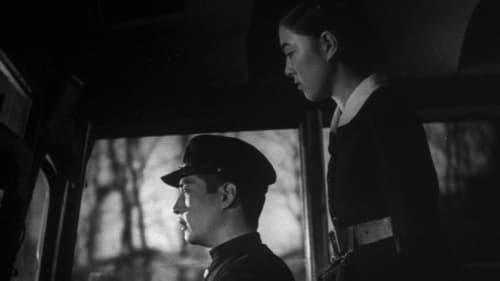
A wealthy family will not allow the military to grow crops on their fields due to their superstitious beliefs about their son's illness.

The story of a boy who befriends a lonely middle-aged man.

Japanese war movie.
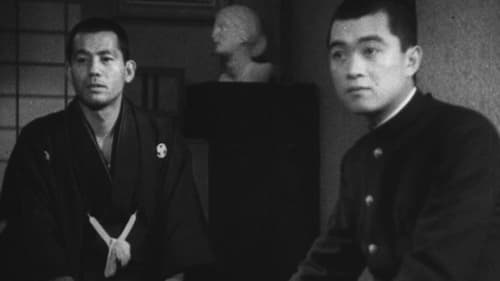
Father
A family story in the year of 1943 during the war. The director is Shunkai Mizuho, who worked on "Hibari no Circus Sad Kobato" starring Hibari Misora after the war. Previously, there is only a 6-minute short version in the National Film Archive, therefore, the full version is this movie is very valuable. This is considered a masterpiece that depicts a happy family of 7 (a father, a mother, 3 sons and 2 daughters).They care about each other, and also trust each other. Father started to ask all the children "what do you want to be in the future?" since an early age. Boys said they want to go to college, they want to be painters, and when it comes to the girls, although they wanted to be generals, their answer was "become a bride, a wife, and a good mother." Brothers and sisters get along well and occasionally fight, but they all discuss the cause, and would apologize to each other. The story was so gentle that it is hard to believe it was during the war.

Hiromasa Nomura World War II era film

Pretty Oshige is deceived by her first love. After this, she lives a hard lifestyle, working at a number of jobs. Her only pleasure is her nephew, who eventually becomes a merchant marine. When Oshige meets her old love ten years later, she is able to forgive him and even thank him for the path her life has taken.

Amusing masterpiece from director Yoshimura Kazusabu divided in two parts taken from the newspaper serial novel of Shishiko Shishi. Like in "Warm Current", Shin Saburi, Mieko Takamine and Mitsuko Mito are appearing, but this is a fresh comedy very unusual for wartime.

This was 1942, so it was a national policy film, no matter what you call it. But when the war was still on the winning side, there wasn't even a little bit of sadness in the film (as the war was getting worse and worse, the burdens on our backs were increasing day by day, and we had to keep forming a line for tomorrow with nowhere to go (Akira Kurosawa's "The Most Beautiful", Admiral Nomura's "Enemy Air Raid", etc.) (Song of Annihilation, directed by Sasaki Yasushi). The film closes with the hope of the blue cloud that is bubbling up in the air. Or it may be the last time that a Japanese film talks about war and looks at the end of the war with an unconcerned eye.

A hostile Chinese nurse (Yamaguchi) who works in an orphanage is won over by the care and commitment of the Japanese doctor (Sano) who treats her wards. Disease outbreaks and family obligations, however, threaten to torpedo their budding romance.

Kajikawa
메이지 시대를 배경으로 한 멜로 드라마이다. 의지할 데 없는 유랑극단의 아름다운 가수 우타는 관대한 상인에 집에 기거하게 되지만 그녀를 바라보는 주위의 시선은 따갑기만 하다. 그가 갑자기 큰 빚을 남기고 세상을 뜨자 장사 경험이 전혀 없는 아들이 가업을 물려받게 된다. 그러나 우타는 그에게 학업을 마칠 것을 권하고 대신 사업을 도맡게 된다.
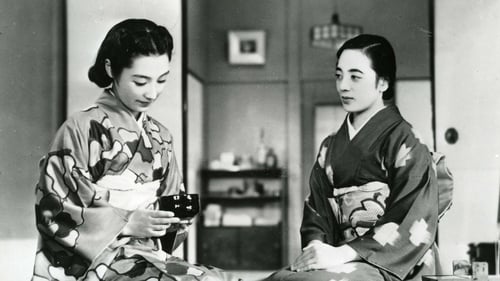
Suzuki
한 가족의 몰락과 재건에 관한 이야기를 담고 있는 이 작품은 당시 흥행과 작품성에서 모두 성공한 초기작으로 장면간의 전환 또는 휴지부로 기능하는 여백 쇼트의 사용, 움직임이 없는 정적인 카메라 등 가장 오즈적이라고 특징지을 수 있는 후기 작품들의 양식과 내러티브 형태가 특징적으로 드러나는 작품이다. 경제계의 거물이었던 도다씨의 갑작스러운 죽음 이후 둘째 아들 쇼지로는 중국 천진으로 돈을 벌기 위해 떠나고 남은 도다 부인과 막내 딸 세츠코는 귀찮은 존재로 외면당한 채 형제들 집을 전전하다 결국 처분조차 힘든 바닷가의 낡은 집으로 옮겨간다. 도다씨의 기일을 지내기 위해 천진에서 돌아온 쇼지로는 어머니와 여동생에 대한 형제들의 태도에 대해 분통을 터트린다.

A story of a store that makes Tabi socks.

Dr.Sawamura
Movie about a devoted and single woman and her daughter. The mother's nickname is "Bokuseki" (wooden head) because of his supposed stubbornness. No.10 in the list of "The 10 best films of 1940" by Kinema Junpo.

A young yakuza student is led back to the straight and narrow path by his uncle.

Kensaku

Kinuyo is a daughter of rice cracker shop in downtown. She fell in love with her sister's boyfriend. It is a story whose theme is warm human relationships in a town of customs and manners.
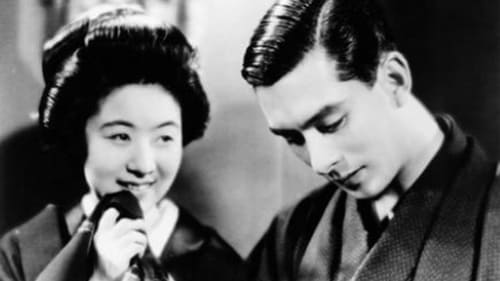
Keizô, Osumi's brother
A young student of traditional dance falls in love with a handsome young man who visits the dance school in order to take photographs.
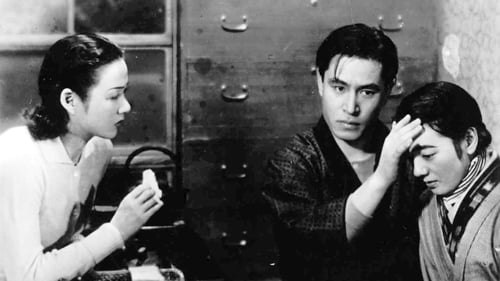
Fujio Gyōda
A man who works late hours at a deadening job lives together with his wife and his younger sister. The younger sister's a modern girl who's starting to receive romantic attention from one of her co-workers.

Father
A follow-up to Children in the Wind, Four Seasons of Children(a.k.a. Kodomo no Shiki) is also based on a Tsubota Joji novel. The film is divided into two chapters, following the young protagonists' minor adventures and real-world awakenings over spring and summer, then autumn and winter.

Haruki
A young doctor, Kozo Tsumura, falls for young nurse Katsue Takaishi. But she's got a secret: she's a widow with a son. Kozo and Katsue decide to run away to Kyoto, but her child suddenly became sick and she just missed the train and Kozo. She makes it to Kyoto finally, but is unable to meet him. Plus she isn't accepted into Kyoto society. She goes back to her hometown and tries to forget him. She quits the hospital to concentrate on her singing. She makes her professional debut with the hit "Aizen Katsura". Kozo is in the audience.

Kudō
The movie follows a young woman (Kinuyo Tanaka), a daughter of a high-ranking businessman and his neglected mistress, as she struggles to ease her mother's loneliness, while also having an affair with her father's subordinate.

Kageyama
Shigeo is an aspiring writer living with his girl friend Minako and hoping for success and a better tomorrow every day. Both live on what Minako earns from working in a café. Shigeo is not happy with the situation and neither is his family who do not approve of Minako. Especially his uncle tries to convince him to leave Minako, even using his influence behind the scenes. Things start to change when Shigeo's sister pays the young couple a visit, being the first member of Shigeo's family to actually get to know Minako in person.

Gunji Ōhira
Pre-war Asakusa was a riotous district of cabarets, dance-halls and brothels - a striking backdrop for Shimazu's story of innocence and experience. Pretty, young Reiko is the new dancer in an infamous theatre troupe, and her fellow performers try to protect her virtue in a land of vice. Meanwhile, an ageing actor wants to be a hero off stage as well as on, and the troupe matriarch Marie has to keep them all together.

Father
젠타와 산페 형제는 아버지의 도시락을 서로 가져다 드리겠다며 싸우는 등 늘 티격태격한다. 특히, 타고난 악동인 동생 산페는 타잔 소리를 내며 골목을 휘젓고 다니는 골목대장이다. 그러던 어느 날, 아버지가 공문서 위조 혐의로 체포되어 감옥에 가고 만다. 형제의 눈부신 여름날이 돌연 끝나버리고, 산페는 시골로 보내진다. 오로지 집에 돌아가고 싶다는 생각뿐인 산페는 시골에서도 매일 사고만 친다.

A Japanese wartime film directed by Yasushi Sasaki.

Sabu Toshinobu is an archaeologist who has taken a liking to Kinuyo Tanaka, the daughter of an archaeologist at an inn in Izu, where he is visiting to conduct an excavation. Sabun gets along well with his childhood friend Michiko Kuwano, but his mother (Fumiko Okamura) is against her, so he gives up easily and ends up being married to Kinuyo Tanaka.

Sabu Toshinobu is an archaeologist who has taken a liking to Kinuyo Tanaka, the daughter of an archaeologist at an inn in Izu, where he is visiting to conduct an excavation. Sabun gets along well with his childhood friend Michiko Kuwano, but his mother (Fumiko Okamura) is against her, so he gives up easily and ends up being married to Kinuyo Tanaka.
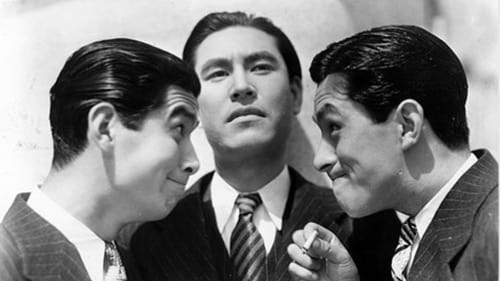
Isoyama - Chief
Three men vying for the same job end up chasing the same girl in this comedy-drama from noted Japanese director Yasujiro Shimazu.

A businessman’s daughter falls in love with one of her father’s employees.

A 1937 Japanese film.

Keizo
Three men fall in love with the same young girl who works in a tonkatsu restaurant in the Shitamachi district of Tokyo.

Doi
Episode in the life of a composer of a popular Japanese song.

A musical film made for the inauguration of Shochiku's Ofuna Studio, with an all-star cast of the era.

A neighbor
Otoku asks her brother Bunkichi to speak with her son Seiichi, a young man for whom sacrificed everything but who now seems to be headed for a wastrel life. Bunkichi admonishes the boy to study harder, but it seems his uncle's advice may already be too late.

Sadanosuke Kajiwara
A melodrama about a businessman's relations with the three women in his life.

Returning villager
아리가토 씨는 젊고 친절한 버스 운전사로, 그가 모는 버스는 가난한 해안가 마을에서 산을 넘어 도시로 향한다. 그는 좁은 길에서 길을 비켜주는 주민들에게 언제나 ‘고맙습니다’라는 인사를 전한다. 딸을 대처로 보내려는 걱정 많은 어머니와 그 딸, 아리가토 씨에게 추파를 던지는 여인 등 오늘도 다양한 승객들이 아리가토 씨의 버스에 오른다.

Teizo
A period piece about the love of a wealthy blind woman, a teacher of koto and shamisen, and her devoted manservant. Based on a novella by Tanizaki Junichiro.

Yoshi-san
A Japanese comedy from the end of the silent era (it has music) from a popular series. A feud, a practical joke and romance are the set up for some great comedy and drama from a team of distinctive appearance who are exploiting their silent cinema styles to the full.

Сигэта
Jyuta, an honest owner of a taxi company, has a younger half-brother who is involved in the yakuza world and doesn’t get along well with his mother. Jyuta tries to correct him…

Ôsaki's father
The story is centered around the devastating experiences of two villagers, Osaki Shuichi, and his cousin, Nishimiura Kinue, when they leave their hometown for the metropolis of Tokyo. They are in love with each other, but Kinue is expected to marry the lawyer Kanda Seiji. In consequence, Shukichi leaves for Tokyo, where he becomes tutor to the son of the rick Iwaki family. The heartbroken Kinue also makes her way to the capital, where she becomes a bar hostess.

Seijiro
The poor novelist Yamamoto is writing his novel, determined and with a headband around his head. With him, the novelist who is always in trouble paying his bills, is the girl Saya who becomes the model for his novel. Saya however is in love with a young driver. When he is forced to move into a spa town as the result of the jealousy of another man Saya is terribly sad. But with the help of Yamamoto the driver's rival can be revealed and Saya can finally be with her beloved.

Heinosuke Gosho evokes in this film the family conflicts engendered by the eternal problem of a father who projects his professional desires on the life of his son. The sister Machiko is the essential link that will allow everyone to apologize to each other and achieve reconciliation
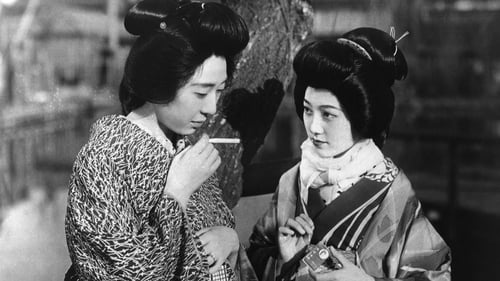
Shôkiku's father
키쿠에는 자신을 희생해서 아들 요시오를 홀로 키우지만 요시오는 언제부터인가 게이샤인 어머니를 부끄러워하며 나쁜 무리들과 어울리기 시작한다. 그를 사랑하는 아름다운 게이샤 테루기쿠는 갱 멤버로부터 그를 구출한다. 그러나 부모의 가난으로 자신의 누이동생이 팔려 갈 운명에 처하자 돈을 벌기 위해 그의 곁을 떠난다.

Japanese silent film.

Kubota, an engineer
"The Dancing Girl of Izu" tells of the story between a young male student who is touring the Izu Peninsula and a family of traveling dancers he meets there, including their youngest girl. The student finds the naïve girl attractive even though he eventually has to part with the family after spending memorable time together.

Neighbor's husband
This pair of gentle yet witty and inventive comedies from the director of The Neighbour's Wife and Mine typify both the formal experimentation of early Japanese sound cinema and the social milieux that Shochiku tended to depict. 'Virtually plotless, and feeling more like comic sketches than fully developed stories,' writes Arthur Nolletti, Jr, 'these light comedies, or farces, take a wholly trivial matter (often a socially embarrassing situation) and use it as a springboard for a succession of gags.' Much of the films' distinction comes from the wit of Gosho's direction, the imaginative use of the new sound technology and the charm of the acting, particularly of the heroines (Kinuyo Tanaka in Bride; Hiroko Kawasaki in Groom). Yet in both films, Gosho finds room for some shrewd observation of character and environment, subtly exploring the values and assumptions of the suburban petit bourgeoisie.
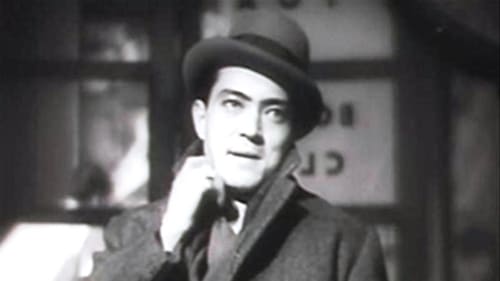
Nozawa
Early Japanese sound film, a remake of Josef von Sternberg’s DOCKS OF NEW YORK set in Yokohama.

The three-hour Ai yo jinrui to tomo ni are / Love, Be with Humanity (1931) starts as a satire of alienation in the world of money, develops into a lumberland epic with a forest fire on Sakhalin Island, turns into a tragedy of King Lear dimensions, and manages to amaze the blasé audience with a happy end in the Wild West.

The love of an older sister who worked as a geisha but decided to open a bar under the auspices of a millionaire

Rokuzo

The 1929 Japanese film "Mother" which helped child actress Hideko Takamine become a star.

A melodrama about an orphan and her mother who are separated and lose contact, but are later reunited.

Genshichi
Two criminal brothers try to go straight but face opposition from one of their criminal cohorts. Considered to be a lost film.













































